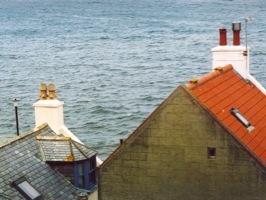An exciting front-page headline in the Eastern Daily Press yesterday – We Can’t Hold Back Mother Nature. Has the penny dropped at last? Is the UK going to abandon all the petty little carbon reduction measures that are making not an iota of difference to the climate but costing taxpayers thousands and raising nice little sums for astute businessmen?
Sadly not. This is a story about abandoning some 25 square miles of coastal land in Norfolk to the sea – one of Natural England’s more cuddly ideas, and one which the Government, based in London and with little support in coastal Norfolk, is happy to go along with. Environment Secretary Hilary Benn is quoted as saying: “Nature is more powerful than all of us.”
Mr Benn was born in London, lives in London and represents Leeds, so he probably doesn’t have to worry too much about eroding shorelines, and it’s not surprising if he’s under misapprehensions about the effect of failing to defend the coast. But he’s also under a misapprehension about what causes loss of land to the sea, linking it to climate change and sea level rise. Or maybe, like so many other people, he’s using those two bogeymen as an excuse for feeble policy-making.
We know that in the last few years global warming has stopped. Or do I mean paused? Last year was noticeably cooler. Naturally this is written off as a blip, and we are told to look at the big picture – the overall trend. The blip argument was not used much when we had what were alleged to be the hottest years on record, but of course that’s different.
Years vary, for various reasons – few of them understood. Rising sea levels, as the IPCC admits, are not likely to be significant this century and for centuries to come, but we should not be surprised at changes. Look at a map of Roman Britain, and you will see much greater incursion by the sea. This was unlikely to have been caused by gas-guzzling chariots or coal-fired power stations on the Appian Way.
Yes, Hilary, nature is more powerful than all of us. But why do we choose to spend money on things we can do nothing about – changes in the global climate – but refuse to spend far less on something we can actually affect? Coastal defences may be expensive, but they are not prohibitively expensive. And they do work, unlike futile measures to reduce carbon emissions.
A letter from one of the EDP’s more alert readers, published the same day as the Benn article, suggests that for the Government to take action, we need to discover that the threatened coast is home to protected species like great crested newts, rare orchids and endangered butterflies. So go out searching, guys, and let me give you some encouragement. I’m told that while the north Norfolk village of Paston is obviously expendable as far as people are concerned, no sea incursion will be allowed there – because the Great Barn by the church is home to a rare colony of barbastelle bats.
